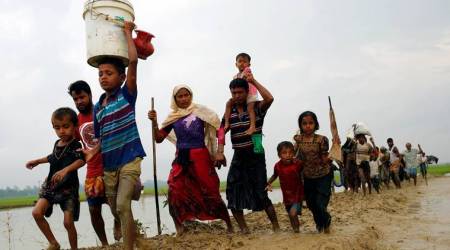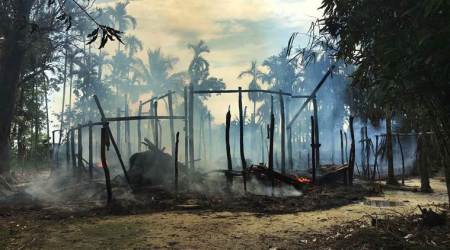 “I am also dismayed by a broader rise of intolerance towards religious and other minorities in India. The current wave of violent, and often lethal, mob attacks against people under the pretext of protecting the lives of cows is alarming,” said Zeid Ra’ad Al Hussein.
“I am also dismayed by a broader rise of intolerance towards religious and other minorities in India. The current wave of violent, and often lethal, mob attacks against people under the pretext of protecting the lives of cows is alarming,” said Zeid Ra’ad Al Hussein.
The United Nations High Commissioner for Human Rights on Monday said he “deplored” the Indian government’s plans to deport Rohingya refugees “at a time of such violence against them in their country”. UN official Zeid Ra’ad Al Hussein specifically mentioned a statement by the Minister of State for Home, Kiren Rijiju, in his speech at the UN Human Rights Council’s 36th session in Geneva. The Indian government has not reacted to the statement. Al Hussein said India “cannot carry out collective expulsions” and return people to a place where they face persecution.
“I deplore current measures in India to deport Rohingyas at a time of such violence against them in their country. Some 40,000 Rohingyas have settled in India, and 16,000 of them have received refugee documentation. The Minister of State for Home Affairs has reportedly said that because India is not a signatory to the Refugee Convention, the country can dispense with international law on the matter, together with basic human compassion.
However, by virtue of customary law, its ratification of the International Covenant on Civil and Political Rights, the obligations of due process and the universal principle of non-refoulement, India cannot carry out collective expulsions, or return people to a place where they risk torture or other serious violations.” Rohingyas have fled to India and Bangladesh after army action against them in the Rakhine state of Myanmar. Many of them have settled in Jammu and Kashmir.
Rijiju had recently said that nobody should preach to India about allowing in refugees as the country has absorbed the maximum number of them. “I want to tell the international organisations whether the Rohingyas are registered under the United Nations Human Rights Commission or not. They are illegal immigrants in India,” Rijiju had said.
Al Hussein’s comments are the strongest by an international diplomat against India regarding Rohingya refugees.
The UN official also spoke about the murder of journalist Gauri Lankesh and the general rise of intolerance in India which, he said, had “dismayed” him.
“I am also dismayed by a broader rise of intolerance towards religious and other minorities in India. The current wave of violent, and often lethal, mob attacks against people under the pretext of protecting the lives of cows is alarming. People who speak out for fundamental human rights are also threatened. Gauri Lankesh, a journalist who tirelessly addressed the corrosive effect of sectarianism and hatred, was assassinated last week,” Al Hussein said.
“I have been heartened by the subsequent marches calling for protection of the right to freedom of expression, and by demonstrations in 12 cities to protest the lynchings. Human rights defenders who work for the rights of India’s most vulnerable groups — including those threatened with displacement by infrastructure projects such as the Sardar Sarovar Dam in the Narmada river valley — should be considered allies in building on India’s achievements to create a stronger and more inclusive society. Instead, many are subject to harassment and even criminal proceedings, or denied protection by the state,” he said.
Al Hussein, a diplomat from Jordan, has been at loggerheads with Indian diplomats in the past. In September last year, India had objected to Al Hussein’s reference of Jammu and Kashmir as “Indian-administered Kashmir” and “Pakistan-administered Kashmir”.
Ajit Kumar, India’s permanent representative to the UN office in Geneva, had said the phrase was “artificial”. “The whole state of Jammu and Kashmir is an integral part of India. Pakistan remains in illegal occupation of a part of our territory. The two cannot and should not be equated.”

